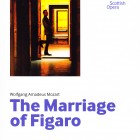Nozze di Figaro 2010Scottish Opera
Read more about the opera Marriage of Figaro
Sir Thomas Allen has sung very little opera in Scotland, but is making up for that in his career as a director. This Figaro staging is hard to fault – only people who cannot understand why opera should ever be staged in the period and style the composer would understand may take exception to the meticulous work of the director and his brilliant designer, Simon Higlett. Thomas Allen sang Figaro very early in his career both on stage and in a TV production, before realising that his voice was better suited to the slightly higher role of the Count, which is a part he has sung in all the best places. He has gained a detailed awareness of what the piece is about. Setting-wise, there were no great revelations, though the last act was, unusually, located among corn-stooks at harvest time - plenty of objects large enough to hide behind.
His extensive experience with the work shows in his deft handling of character and social class. For instance, in the second act countless directors seem unable to cope with the various entrances to the Countess’s boudoir. Susanna may enter as a matter of course, the Count on sufferance (he knocks). For anyone else to march in would be unthinkable. So Antonio is already watering the flowers on the balcony and can come in easily. Figaro doesn’t enter himself – Susanna is leaving discreetly having brought about her masters’ reconciliation and has already opened the door when Figaro arrives. Only Marcellina bursts in, clearly remembering that she was Rosina’s governess, but not yet accepting that she should no longer just barge in to the Countess’s quarters. All beautifully judged. And of course all the performers act in such a natural and detailed manner.
The conductor was the company's Music Director, not previously known here for his Mozart, and it proved to be one of his best performances, with tempi ideally judged, light and airy textures, and always in sympathy with his singers. The two newcomers, Franco Facini and Ulrike Mayer, the Bartolo and Cherubino, both fitted in well.
Kate Valentine and Nadine Livingstone, as expected, sounded near-ideal, and were similar enough in figure to make the last act events feasible. Thomas Oliemans successfully followed up his account of Rossini's Figaro from Sir Thomas's first Scottish staging, while Roderick Williams was a thoroughly human and fallible Count.
Performance Cast
- Figaro the Count's valet
- Susanna the Countess's maid
- Cherubino the Count's page
- Count Almaviva a Spanish grandee
- Bartolo a doctor, the Countess's former guardian
- Marcellina Bartolo's housekeeper
- Don Basilio a priest and music master
- Countess Almaviva
- Antonio a gardener, Susanna's uncle
- Don Curzio a lawyer
- Barbarina daugher of Antonio
- First Peasant Girl
- Second Peasant Girl
Production Cast
Performance DatesNozze di Figaro 2010
Theatre Royal, Glasgow | Glasgow
29 Oct, 19.15 31 Oct, 16.00 30 Nov, 19.15 2 Dec, 19.15 4 Dec, 19.15
Eden Court Theatre | Inverness
4 Nov, 19.15 6 Nov, 19.15
His Majesty's Theatre, Aberdeen | Aberdeen
11 Nov, 19.30 13 Nov, 19.30
Festival Theatre, Edinburgh | Edinburgh
19 Nov, 19.15 21 Nov, 16.00 23 Nov, 19.15 25 Nov, 19.15 27 Nov, 19.15





